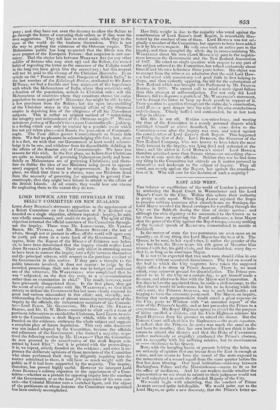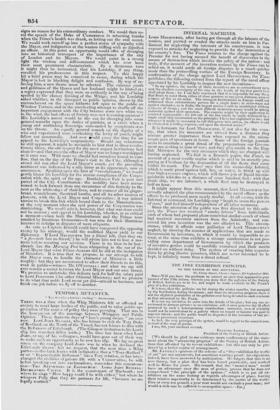EAST AND WEST.
Too balance or equilibrium of the world of London is preserved by stationing the Royal Court in Westminster and the Lord Mayor's Court in the City. Within this sphere their authority is pretty nearly equal. When King James enjoined the lieges to practise military exercises after church-hours on Sundays, the Lord Mayor arrested the Royal carriages for travelling through the City on the Sabbath during the time of divine service : and although the civic dignitary so far succumbed to the Crown as to let them loose on receiving the Royal ordinance, a later Mayor shut the gates of the City against the Royal troops,—to say nothing of the 11:2oical speech of BECKTORD, immortalized in marble at Guildhall.
In the matter of state the two potentates are even more on an equality ; or, if any thing, the Lord Mayor has the best of it. The Queen, to be sure, in her royal robes, is rather the grander of the two : but then, the Mayor wears his silk gown of Mazarine blue trimmed with fur, his gold chain, and his cocked-hat, every day— that is, so long as he continues Mayor. It is not to be expected that two such suns should shine in one firmament without occasional disturbances. The last on record is time huff in which the City magnates have taken the supposed slight offered to them by Prince ALBERT. There is. we must admit, some apparent ground for dissatisfaction. The Prince pro- mised to be in the City on a certain day, to get himself made a freeman, and afterwards dine with the Mayor and Corporation. A few days before the appointed time, he sends a civil message, to the effect that it would be indecorous for him to be feasting while his wife's aunt, the Princess AUGUSTA, was in such bad health; and beg,gieg to have the ceremony postponed. The Mayor, on inquiry, finding that such postponement would entail a great expense on the City, posts to Windsor with "an amended report" of the state of the Princess's health, and, at last persuades the Prince to_a compromise. His Royal Highness agrees to attend for the purpose of being enrolled a citizen ; and his Civic Highness releases his Royal Highness from his promise to attend time dimmer. But the Eastern Court still cherishes its displeasure—alta mente repostum. It reflects that the Princess AUGUSTA was much the same as she had been for months ; that her own brother did not think it inde- corous to attend the dialler; and that the Duke of CAMBRIDGE (either maliciously or stupidly) attributed the Prince's absence, not to sympathy with his suffering relative, but to uxoriousness or — obedience to his Queen.
Now, with the bungling hands at present holding the helm, we
are seriously of opinion that one breeze from the East is enough at a time, and are averse to have the vessel of the state exposed to
the momentum of a second squall from time same quarter before the first has done blowing. Our local habitation—mid-way between Buckingham Palace and the Mansionhouse—seems to fit us for the office of mediators. And let our readers decide whether the representation we are about to submit to their judgment would not be well calculated to sooth the offended Majesty of the City.
We would begin with admitting, that the conduct of Prince Ammer seemed quite indefensible. We would point out to the Lord Mayor, as quite a new discovery, that the Prince's letter as-
signs no reason for his extraordinary conduct. We would then re-
ed the speech of the Duke of CAMBRIDOE in returning thanks when the Prince's health was drunk, as letting out the real secret.
We would work ourself up into a perfect storm of sympathy with
the Mayor, and indignation at the wanton trifling with so dignified an officer. At this point an opportunity would offer of diverging
into an historical retrospect of the importance of the city
of London and its Mayors. We would paint in a strong light the wisdom and self-command which has ever been
their most prominent characteristic. By a dexterous turn
it might then be insinuated, that his Lordship, if any thing, excelled his predecessors in this respect. T. this happy
hit a brief pause may be conceived to ensue, during which the Mapr is lost in blushing delight and confusion. By way of re- lieving him, a new theme must be selected. The extreme youth and giddiness of the Queen and her husband might be hinted at;
a regret expressed that they were so evidently in the way of being spoiled by the clumsy fawning of the Whigs; and his Lordship
asked whether, in the disregard to public opinion, shown by the encroachment on the space hitherto left open to the public on Windsor Terrace, and in the unreflecting attempt to shuttle off the
important engagement with the City because sonic new whim was in the wind, the bad effects of flattery were not becoming apparent ? His Lordship's assent would be the cue for diverging into sonic
general remnrks upon the duties of patriots, at a crisis when a
young and unthinking Sovereign surrounded by sycophants -was on the throne. An equally general remark on the dignity of a
wise and experienced man overlooking the levity of youth, might follow not unnaturally. And now would come the time for an appeal to his Lordship's magnanimity. Should any reluctance be still apparent, it might be advisable to hint that in these revolu- tionary times, the old respect for the most august institutions had abated—and that even the office of Mayor was no longer worshipped as it once was. With tears we should feel ourselves bound to con- fess, that on the day of the Prince's visit to the City, although a crowd did run after the Lord Mayor's coach, yet the prevailing sentiment was indicated by a silly titter at its appearance, now so uncommon. Speaking upon the hint of "revolutionary," we would gently blame his Lordship for the unwise compliance of' the Corpo- ration with the spirit of the age. Bartholomew Fair is part and parcel of the City Constitution : the mobility have been accus- tomed to look forward from one recurrence of this festivity to the next as the white-days of their lives, and to connect all its ginger- bread, roundabouts, theatrical booths, and all its other sources of pleasure, with the Lord Mayor and Corporation : it was indeed unwise to break this link which bound them to the Mansionhouse,
at the very moment when the real power of the Corporation was diminishing. We would admit, however, that what was done could not be undone ; and appeal to his Lordship, whether, at so critical a moment—when both the Mansionhouse and the Palace were assailed by licentious Democrats—it was wise for their illustrious inmates to indulge in disputes of mere etiquette.
As sure as Captain I3obadil could have conquered the opposing enemy by his strategy, would the mollified Mayor yield to our
diplomacy. If Lord MELBOURNE has a friend left, (but they say
" a favourite has no friend,") he will advise him not to lose a mo- ment before securiog our services. There is no time to be lost : already has the Morning Post been whispering in the ear of the
Lord Mayor that what Prince ALBERT did he did at the instigation of Ministers. It is true that we propose, in our attempt to talk the Mayor over, to handle the character of Ministers a little roughly : but they are accustomed to allow their friends to do this, even in public—witness Mr. O'CONS'ELL; and what we say will
ever remain a secret between the Lord Mayor and our own breast. We promise to undertake this delicate task for half the salary paid to Lord Possoser (the other Oriental Minister); and we promise to do what that noble Lord never yet did—attend to business, and finish one job before we fly off to another.



























 Previous page
Previous page